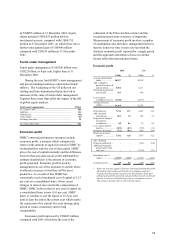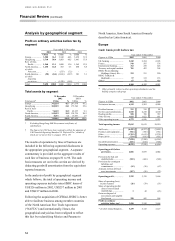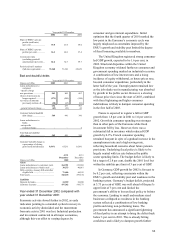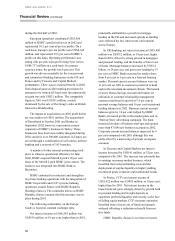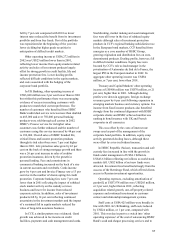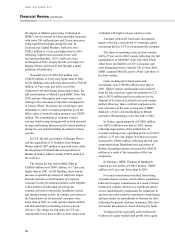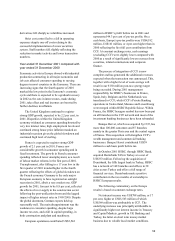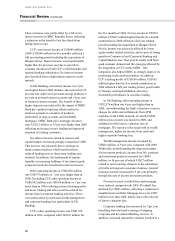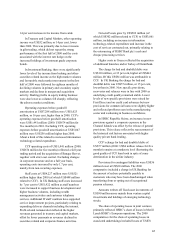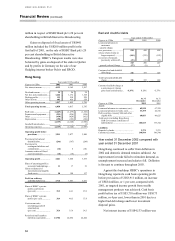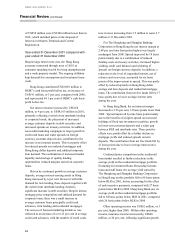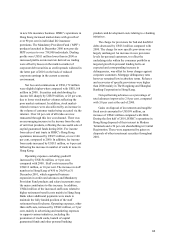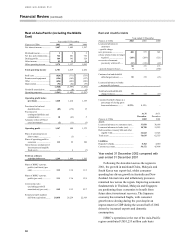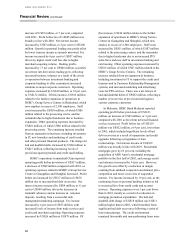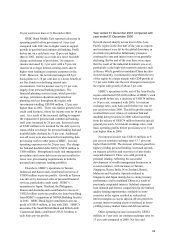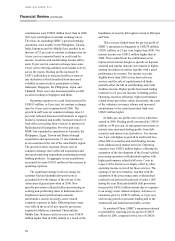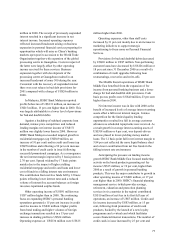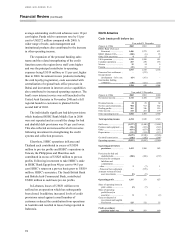HSBC 2002 Annual Report Download - page 65
Download and view the complete annual report
Please find page 65 of the 2002 HSBC annual report below. You can navigate through the pages in the report by either clicking on the pages listed below, or by using the keyword search tool below to find specific information within the annual report.63
US$32 million, or 1 per cent, lower than in 2001.
Further growth in personal lending, particularly
mortgages and credit cards, and an improved spread
arising from lower funding deposit costs were offset
by intense competition reducing spreads on mortgage
and commercial lending. In addition net interest
income benefitted from a strong treasury
performance. The reduced spreads on mortgages
reduced net interest income by US$142 million.
There was also a considerable reduction in the
benefit of net free funds as average interest rates
remained low.
Average customer advances increased by
US$2.0 billion compared with 2001, with growth in
mortgages and credit cards. Average credit card
advances increased by a further 15 per cent
compared to 2001. Term lending to corporate and
commercial customers also increased, despite
subdued demand for lending.
For the Hongkong and Shanghai Banking
Corporation in Hong Kong actions taken to improve
lending mix and target lower cost deposits held net
interest margin essentially flat, the actual margin
falling by 1 basis point to 2.47 per cent. Spread
widened by 13 basis points, driven by a strong
treasury performance, suspended interest recoveries,
increased levels of high-yielding credit card
balances, and a greater level of low cost deposits.
These factors more than offset lower spreads on
mortgages and deposits. Continued price competition
in the residential mortgage portfolio, excluding the
Government Home Ownership Scheme loans,
resulted in a further reduction in the average yield on
the residential mortgage portfolio to 151 basis points
below the bank’s best lending rate (‘BLR’ ) in 2002.
The overall improvement in spread was offset by a
reduction in 14 basis points from the benefit of net
free funds, as average interest rates remained low.
Hang Seng Bank’s net interest margin fell by 10
basis points to 2.46 per cent. Net interest spread
improved, driven by improved spreads on debt
securities and higher levels of low-cost deposits.
These were offset by lower spreads on mortgages –
Hang Seng Bank’s average yield on residential
mortgages was 149 basis points below BLR in 2002
– and a lower benefit from net free funds as average
interest rates remained low.
Other operating income increased by US$65
million, or 4 per cent, to US$1,917 million. Fee
income grew by US$92 million, or 8 per cent, to
US$1,264 million, driven by growth in revenues
from wealth management initiatives. Sales of unit
trusts were strong, including the sale of over US$4
billion of funds launched by HSBC in 2002, up 33
per cent compared with 2001. Revenues from
insurance and underwriting also increased strongly.
Revenue from cards also increased by US$9 million,
or 4 per cent. There was also growth in the
Hongkong and Shanghai Banking Corporation in
Hong Kong in Corporate Banking revenues, due to
higher income from structured and corporate finance
transactions. Other income increased by US$59
million, driven by improved underwriting results.
Dealing profits fell by US$85 million, or 39 per cent,
due to lower profits on debt securities as credit
spreads widened following the series of corporate
scandals in the USA. Part of the decline was also
attributable to treasury positions which generated
improved net interest income at the expense of lower
dealing profits as hedge costs were reflected on that
line. Foreign exchange trading remained strong with
profits increasing 11 per cent over 2001.
Operating expenses were in line with 2001.
Staff costs fell by US$30 million, driven by a
reduction in full time equivalent headcount of 868 as
back office processing functions transferred to
HSBC’s Group Service Centres in India and
mainland China, and the non-recurrence of a pension
top-up in Hang Seng Bank in 2001. These reductions
were partially offset by higher revenue-related
remuneration. Other administrative expenses
increased by US$31 million, or 7 per cent, due to
continuing marketing initiatives, higher IT costs to
support business growth, and higher professional
fees in relation to higher levels of structured finance
transactions.
The charge for bad and doubtful debts increased
by US$49 million, or 25 per cent, to US$246 million.
The increase was driven by new provisions against
credit card lending, rising to US$250 million in
2002, compared with US$122 million in 2001;
provisions against other retail lending also increased,
as bankruptcy filings grew. Provisions against the
mortgage portfolio fell as delinquency rates fell.
Recoveries and releases against commercial and
corporate customers were lower than in 2001,
although economic conditions remained difficult.
The above increases were partially offset by a release
in general provisions reflecting a reduction in latent
losses.
Gains on the disposal of fixed asset investments


